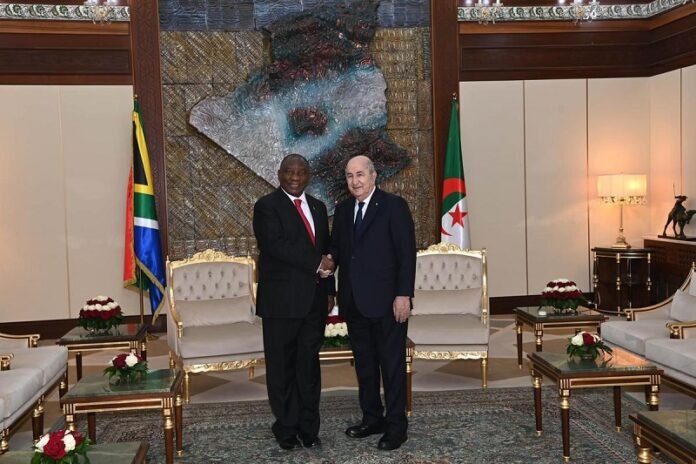Relations between Algeria and South Africa have seen notable convergence, reflecting shared concerns over Morocco’s growing influence in Africa. The visit of South African President Cyril Ramaphosa to Algeria comes at a critical time as both countries aim to strengthen their alliance to address challenges posed by geopolitical and economic shifts in the region.
However, this alliance raises questions about its true objectives and its capacity to counter Morocco’s accelerating successes.
Competing for Influence: Morocco as a Rising Regional Power
In recent years, Morocco has emerged as a pivotal player in Africa, leveraging strategic investments and robust diplomatic ties:
- The Nigeria-Morocco Gas Pipeline Project, which enhances economic interconnectivity in West Africa.
- Banking and commercial investments across West and Central Africa, making Morocco a key economic partner for many countries.
- Diplomatic successes, with a growing number of countries recognizing Morocco’s sovereignty over its southern provinces and international support for the autonomy plan as a realistic solution to the Sahara dispute.
These moves have sparked concerns in Algeria and South Africa, both grappling with economic challenges and diminishing regional influence.
Mixing Issues: A Quest for International Legitimacy
During Ramaphosa’s visit, Algeria and South Africa attempted to link the artificial Sahara conflict to the Palestinian cause to legitimize their support for the Polisario Front. Algerian Foreign Minister Ahmed Attaf emphasized “supporting people’s self-determination” while overlooking other human rights issues in Africa, including minority rights in neighboring states.
This approach seeks to garner popular sympathy by connecting the dispute to broader liberation struggles, but it raises questions about its credibility. Can such strategies bolster Algeria and South Africa’s international stance, or do they reveal their weak position against Morocco’s successes?
Economy at the Core of Rivalry
South Africa, as Africa’s largest economy, faces internal challenges, including sluggish growth and rising unemployment. Similarly, Algeria remains heavily reliant on oil and gas revenues, lacking genuine economic diversification.
Their alliance aims to weaken Morocco’s influence in Africa, where the Kingdom relies on growing economic partnerships through infrastructure projects, finance, and renewable energy. How can Algeria and South Africa enhance cooperation amidst their economic crises?
Diverging International Positions: The Role of Global Powers
While Algeria and South Africa seek to unite their stances against Morocco, they face growing international support for Morocco’s sovereignty over its Sahara:
- France and the United States have clearly endorsed the autonomy initiative.
- Within the African Union, pro-Morocco positions have risen, leaving Algeria and South Africa isolated in the continent.
How can Algeria and South Africa address this waning international support?
The Alliance’s Future: Can It Last?
Despite their efforts to strengthen ties, questions remain about the sustainability of this collaboration:
- Regional competition between the two countries may hinder their ability to achieve long-term mutual interests.
- Morocco continues to score diplomatic and economic victories, limiting the alliance’s impact on the international stage.
Conclusion: A Challenge Alliance or a Desperate Maneuver?
The Algeria-South Africa alliance reflects growing concerns over Morocco’s emergence as an economic and political power in Africa. However, amid Morocco’s sustained successes, this alliance remains hostage to internal crises and regional contradictions that may undermine its effectiveness.
Can Morocco capitalize on this situation to consolidate its position in the continent? And how can Algeria and South Africa reformulate their strategies to address this reality?


